|
|
|
Sort Order |
|
|
|
Items / Page
|
|
|
|
|
|
|
| Srl | Item |
| 1 |
ID:
149759
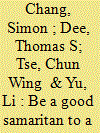

|
|
|
|
|
| Summary/Abstract |
We conducted a large-scale lost letter experiment in Beijing, a megacity with > 21 million residents, to test if the observed altruistic attribute of the letter recipient would induce more passersby to return the lost letters. The treatment letters were addressed to a nationally renowned charitable organization in China, while the control letters were intended to an invented individual. A total of 832 ready-to-be-posted letters were distributed in 208 communities across eight districts in the city. The overall return rate was 13%. Yet, the return rate of the treatment letters (17%) was nearly twice as high as that of the control letters (9%). The finding adds large-scale field experiment evidence in support of the other-regarding preferences theory. In addition, we also found that the lost letters were more likely to be returned if they were dropped in communities with a relatively higher income or a postal box located closer.
|
|
|
|
|
|
|
|
|
|
|
|
|
|
|
|
| 2 |
ID:
107976
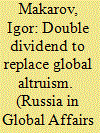

|
|
|
| 3 |
ID:
165887
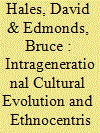

|
|
|
|
|
| Summary/Abstract |
Ethnocentrism denotes a positive orientation toward those sharing the same ethnicity and a negative one toward others. Previous models demonstrated how ethnocentrism might evolve intergenerationally (vertically) when ethnicity and behavior are inherited. We model short-term intragenerational (horizontal) cultural adaptation where agents have a fixed ethnicity but have the ability to form and join fluid cultural groups and to change how they define their in-group based on both ethnic and cultural markers. We find that fluid cultural markers become the dominant way that agents identify their in-group supporting positive interaction between ethnicities. However, in some circumstances, discrimination evolves in terms of a combination of cultural and ethnic markers producing bouts of ethnocentrism. This suggests the hypothesis that in human societies, even in the absence of direct selection on ethnic marker–based discrimination, selection on the use of fluid cultural markers can lead to marked changes in ethnocentrism within a generation.
|
|
|
|
|
|
|
|
|
|
|
|
|
|
|
|
| 4 |
ID:
116860
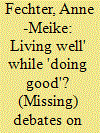

|
|
|
|
|
| Publication |
2012.
|
| Summary/Abstract |
This paper takes at its starting point public criticism of international aid workers who appear to be 'doing well out of poverty'. Based on fieldwork in Cambodia, the paper suggests that such public perceptions are mirrored by some aid workers' uncertainties about the moral dimensions of their own and others' lifestyles. Significantly, analyses of such public and private unease are largely absent from development ethics, even though comparable professions, such as nursing or social work, having produced substantial work on these issues. I argue that the scarcity of equivalent studies in development studies is partly the result of a tendency to foreground the 'other'-the world's poor-while rendering those who deliver aid invisible. Placing 'aid recipients' and 'aid givers' in separate categories, together with an emphasis on collective rather than individual moral responsibilities, not only makes it difficult to conduct open debates on the role of altruism and professionalism among aid workers, but also indicates how practices of 'othering' continue to inform aspects of development theory and practice.
|
|
|
|
|
|
|
|
|
|
|
|
|
|
|
|
| 5 |
ID:
047444
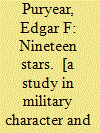

|
|
|
|
|
| Publication |
New Delhi, Lancer International, 1988.
|
| Description |
xviii, 437p.
|
| Standard Number |
8170621534
|
|
|
|
|
|
|
|
|
|
|
|
Copies: C:1/I:0,R:0,Q:0
Circulation
| Accession# | Call# | Current Location | Status | Policy | Location |
| 043298 | 355.033041/PUR 043298 | Main | On Shelf | General | |
|
|
|
|
| 6 |
ID:
103362
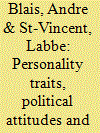

|
|
|
|
|
| Publication |
2011.
|
| Summary/Abstract |
This article examines the link between personality traits, political attitudes and the propensity to vote in elections, using an Internet panel survey conducted in two Canadian provinces at the time of the 2008 federal election and the subsequent provincial elections. It first establishes that the two most proximate attitudes that shape one's propensity to vote are political interest and sense of civic duty. The article then look at specific personality traits (altruism, shyness, efficacy and conflict avoidance) that could affect level of political interest, civic duty and the propensity to vote in elections. In the last part of the analysis, a model is proposed and tested, according to which the impact of personality traits is indirect, being mediated by interest and duty. The article shows that the data are consistent with such an interpretation.
|
|
|
|
|
|
|
|
|
|
|
|
|
|
|
|
| 7 |
ID:
053835
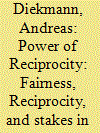

|
|
|
| 8 |
ID:
164986
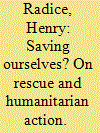

|
|
|
|
|
| Summary/Abstract |
This article contributes to the international political theory of humanitarianism by unpicking the politics of humanitarian action’s simplest expression: saving human lives in the name of humanity. Both saving lives and defining notions of common humanity are closely interrelated acts of power. What saving a life means depends on a prior definition of humanity; humanitarians’ acts of rescue are the measure of their commitment to humanity. The politics of rescue and the politics of humanity are inextricably linked. The article explores four facets of this nexus. First, it considers the meanings of rescue, from saving bodies to saving lives, linked to contingent understandings of humanity. Second, it turns to the rescuers, for whom rescue performs particular functions, not least the need to preserve a sense of self. Third, it situates their often narcissistic motives in relation to the consequences of humanitarian action. Fourth, it addresses the power imbalance inherent in rescue and the problem of causing harm. It concludes that rescue is always an act of presumption, but one that can be tempered by humanitarian actors willing to embrace their role as ‘moral politicians’ (Walzer), aware of their power and their dirty hands, and open to contrasting understandings of humanity.
|
|
|
|
|
|
|
|
|
|
|
|
|
|
|
|
| 9 |
ID:
120828
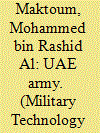

|
|
|
|
|
|
|
|